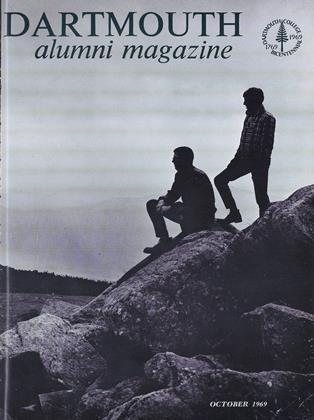By Prof. Herbert F.West '22 (Emeritus, Comparative Literature). Hanover, N. H.: Westholm Publications, 1969. 112 pp. $8.50.
This is a terrific story — and one virtually untold until the appearance of this book. With names changed, it is the tale of a disaster which actually occurred in a World War I convoy of British ships carrying American troops across the North Atlantic in October 1918. The convoy was struck first by a Spanish flu epidemic which decimated both troops and crews and then by one of the worst North Atlantic storms on record. As a result of a collision during the storm, one of the ships, the HMS Cephalonia, was driven against the cliffs of Islay off the Scottish coast. Although a British destroyer made four dangerous runs to take men off the stricken vessel, several hundred American troops died as the ship finally broke up. Many whose bodies were recovered lie today in a small cemetery above Saligo Bay.
For anyone who asks, "Was you there, Charlie?", Herb West was indeed there and he appears in the book as Corporal Latham of the 159th Artillery. And his telling of the tale is marvelous — especially the hint of foreboding which he develops at the very beginning, his feel for the human tensions — some subtle, some not so — which build within the ship, and his art of suspense as the final catastrophe comes. All this reads so effortlessly that one can easily miss something else that is there as well. For this is not only an exciting story; it is also a book which required a great deal of careful research even for an author who himself lived through the experience. For example, the exact navigational details of a World War I convoy crossing are all there, as are the medical details of an influenza epidemic on an ill-prepared ship. Then there is the famous Herb West touch of humor. Ship Captain Williams' small bookcase curiously included Henry James' The Turn of theScrew, "given him by a maiden aunt who had thought it a book on marine engineering. That at least was what he told his chief officer."
Finally, this is an elegant volume in terms of type, paper and binding — so elegant that it feels good just to hold it. Buy it. Read it. It will be your best evening of reading in years.
Mr. Starzinger teaches in Dartmouth'sDepartment of Government.
 View Full Issue
View Full Issue
More From This Issue
-
 Feature
FeatureThird Century Fund Launches General Campaign Among Alumni
October 1969 -
 Feature
FeatureThe Transcending Great Issues
October 1969 -
 Feature
FeatureA Scientific Centennial for Dartmouth
October 1969 By ALLEN L. KING -
 Feature
FeatureWhitewater Racing Gains New Status
October 1969 By JAY EVANS '49 -
 Feature
FeatureBicentennial Draws Unusual Gifts
October 1969 -
 Article
ArticleWith the Big Green Teams
October 1969
VINCENT E. STARZINGER
Books
-
 Books
BooksTHE BURNING FOUNTAIN: A STUDY IN THE LANGUAGE OF SYMBOLISM.
February 1955 By F. C. FLINT -
 Books
BooksOuting Club Publishes A New Trail Guide
OCTOBER 1968 By JOHN R. PERSON '69 -
 Books
BooksLATIN-FOURTH YEAR.
June 1931 By Lawrence Leighton -
 Books
BooksMANY-COLORED BELGIUM
OCTOBER 1931 By Leon Verrriest -
 Books
BooksTHE MEANING OF MODERN POETRY.
MAY 1965 By ROBERTS W. FRENCH '56 -
 Books
BooksMAGIC SPADES
FEBRUARY 1930 By Wm. Stuart Messer



